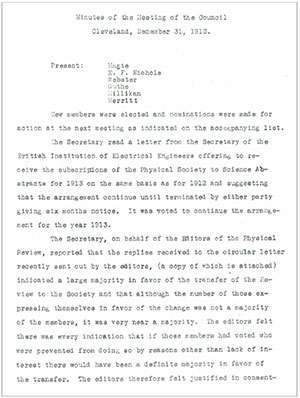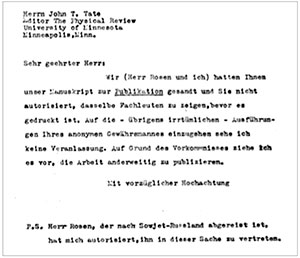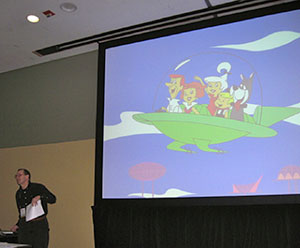Celebrating 100 Years of Physical Review at APS
by Don Howard

First page of the minutes of the December 1912 APS meeting outlining the decision to take over Physical Review.

Original of the letter from Einstein to Tate when Einstein’s “gravity waves” paper was rejected.

Mark Doyle, APS director of Journal Information Systems, at the Physical Review Centennial Session.
A highlight of the FHP program at the 2013 March meeting was the session on “Celebrating 100 Years of Physical Review at APS.” Organized by former APS Editorial Director, Martin Blume, this session both commemorated an important anniversary in the history of APS and used the occasion to reflect on the future of APS publications.
The session opened with Blume, speaking under the title “In the Beginning…,” about the founding of Physical Review at Cornell in 1893, under the editorial direction of Edward L. Nichols, Ernest Merritt, and Frederick Bedell, and about the decision in December 1912 to bring the journal under the control of APS the following year, albeit with the editorial operation remaining at Cornell for many years.
Two talks examined specific issues of importance to the Physical Review in the first half of the twentieth century. First, Robert Crease looked at “The American Reception of the Quantum as seen by the Physical Review, 1900-1927,” highlighting the scant mention of the quantum theory during the years of Series I of the journal (until 1912), and then the rapid acceleration of interest during Series II, especially in the 1920s.
Daniel Kennefick then summarized the history of Einstein’s relationship with the Physical Review, including the publication in 1935 of the very famous Einstein-Podolsky-Rosen paper, “Can Quantum-Mechanical Description of Physical Reality Be Considered Complete,” and the publication also in 1935 of the Einstein-Rosen paper on “The Particle Problem in General Relativity,” which featured the first introduction of the idea of the “Einstein-Rosen bridge,” now much better known by the name “worm holes.” Kennefick also discussed the curious episode of Physical Review editor John Tate’s rejection of the 1936 paper by Einstein and Rosen on gravitational waves, this on the strength of an anonymous referee’s report that the paper contained a crucial error. Recent detective work by Kennefick (with help from Bloom) identified the referee as H. P. Robertson. While a corrected version of paper later appeared in the Journal of the Franklin Institute, a clearly peeved Einstein wrote to Tate in July of 1936:
“We (Mr. Rosen and I) had sent you our manuscript for publication and had not authorized you to show it to specialists before it is printed. I see no reason to address the — in any case erroneous — comments of your anonymous expert. On the basis of this incident I prefer to publish the paper elsewhere.”
An important transition for Physical Review, starting in the 1990s, was the move into the world of digital publication. Mark Doyle, himself instrumental in guiding the transition, gave an informative summary of these developments, emphasizing the often leading role that APS played in pioneering new forms of publication and access, such as PROLA, the Physical Review Online Archive, and the conversion of the entire editorial process to an online form.
The session concluded with a forward-looking talk by current APS Editorial Director, Gene Sprouse, “The Physical Review Grows into a Family of Journals.” Among the several important points made in this talk, perhaps most noteworthy were the data presented about the rapidly changing demography of APS journals, as readership, manuscript submission, and refereeing become ever more international in character. The recent and rapid growth of Chinese physics as represented in the readership of and authorship in Physical Review points us toward a dramatically different intellectual landscape in the twenty-first century.
Dr. Don Howard is Professor of Philosophy at the University of Notre Dame and Director of Notre Dame’s Graduate Program in History and Philosophy of Science.
The articles in this issue represent the views of their authors and are not necessarily those of the Forum or APS.
